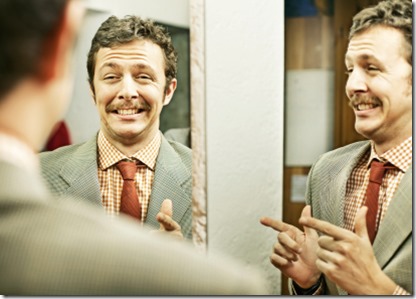Should You Really Practice In Front of A Mirror?
In almost every public speaking book, authors offer a piece of advice that has gone unchallenged for generations: practice your speech in front of a mirror.
The logic behind their advice is that by rehearsing with a mirror, you’ll be able to see yourself in real time, gauge your effectiveness, and make instant adjustments.
If you’ve tried it and it works for you, go for it. But for most people, I can’t help thinking that practicing in front of a mirror serves as more of a distraction—one that makes you focus on your smallest facial expressions and gestures while taking your eye away from the larger picture.
It reminds me of another piece of public speaking “wisdom” that encourages you to reduce your fear by visualizing your audiences naked. (Since the average business audience isn’t made up of people built like Matthew McConaughey or Heidi Klum, I’ve always found that advice more off-putting than helpful.)
So how should you practice?
A video camera is a much more “real-life” gauge of how you’re doing as a speaker. Whereas a mirror presents a “close up” that no audience will ever see, a video camera is a much better proxy for how the audience will actually see you (from several feet away, not inches).
Even when using a video camera, people tend to focus on the wrong things (read this post about the woman with “bumpy hair”). That tendency is only exacerbated by a mirror; if you’re standing so close to the mirror that you can see the inside of your mouth, you’re almost certainly going to hyper-analyze things that don’t really matter to your audience.
So before your next speech, grab a video camera and record yourself. If you don’t have one, try mounting your smartphone on an inexpensive tripod. If someone is helping you, ask them to vary between wide shots (which show your full body) and medium shots (which show you from the waist up).
Watch the tape back, identify the two or three biggest things you want to change about your performance, and do another practice run. See if you improved in those two or three areas. If you did, add another element you’d like to improve, and so on.
Reserve the mirror for a quick final check of your makeup, teeth, and wardrobe before you hit the stage. Leave it behind during your practice runs.
Please leave your personal experiences about practicing with or without a mirror in the comments section below. Does it work for you? If not, what works better for you?




Hi Brad and Christina,
I’m a businessman and one of the founders of Gymboree. Before we were a children’s clothing chain, we were a child-parent, play-movement program for children aged 1 – 4 and, of course, for their parents, too.
Most of us (not me – I was the MBA) were involved in developmental psychology and were interested in learning how children learn.
Later I moved into complex, consultative sales with Compaq and HP and now own my own a sales training consultancy and teach sales at the University of Arizona’s business school, the Eller College.
I’m now researching a training method based on doing, not reading, and would appreciate your thoughts, comments.
Imagine an interviewer or a sales prospect making a statement or posing an objection or question that require a response or answer . We call it an SOQ. We video the most common SOQs, each one taking about 15 seconds.
Then we video the best candidates or sales executives delivering their own best-of-class answers (or responses), which we call BOCAS. These are ‘models.’
We then provide a ‘system’ that allows sales trainees to view the models and to video their own BOCAs in their own words, their own styles, using their own smart phones, tablets or laptops. They don’t read, they do.
After about 15 ‘takes’ they then save their BOCA to a ‘page’ that contains windows of other the other BOCAs of their peers.
Members of the sales team then review all of their peer’s BOCAs and, based on that, revise their own BOCAs…or not. In the process, they ‘memorize’ their own BOCA (proprioceptive and spoken) and learn a few new ones along the way.
Thoughts?
Sam Williams
520-390-0586
[…] but just as important as spending time practicing is ensuring that your practice is productive. One of the best ways to practice a speech is by capturing of a video recording of yourself. I know, I know, this sounds […]